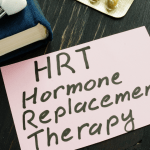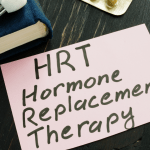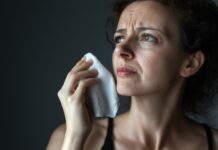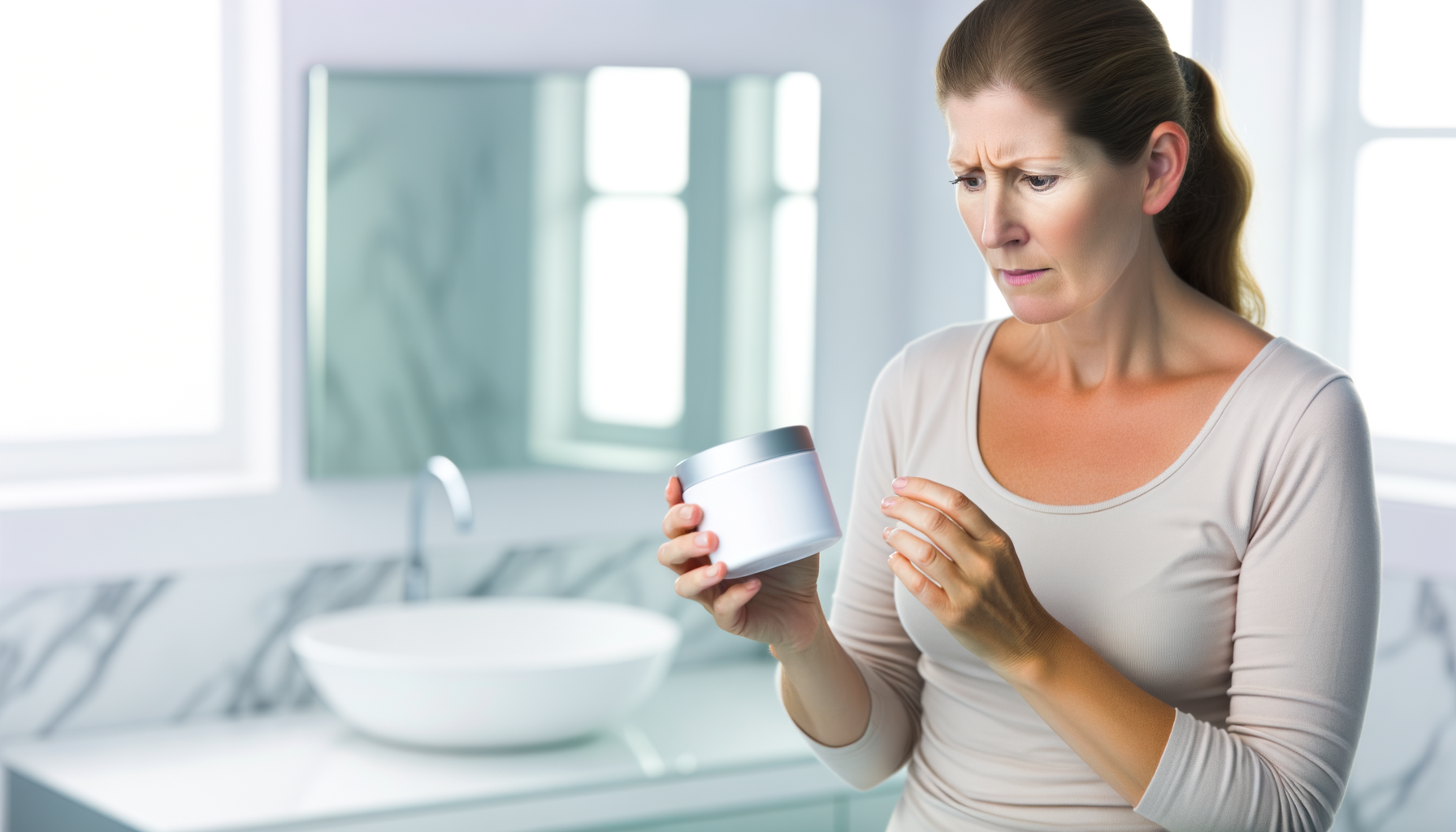- Are you one of those frustrated women who’s in menopause and wants some answers?
- Are you in menopause and is your health suffering?
- Are your friends on HRT and you’ve been counseled by your doctor that you do not need HRT?
- Has your doctor played down the significant benefits of balancing hormones in menopause?
- Are you too old for hormones? Can I start taking hormones 10 years post menopause?
- Has your doctor frightened you from taking hormones, saying they can increase your risk of certain cancers?
- Am I at a higher risk of breast cancer?
- Every time I tell my gynecologist what I’m taking, hormone wise, they look at me with raised eyebrows.
These hormones I take are prescribed to me by a hormone specialist.
And this hormone specialist is in another country.
First of all, where I live, they don’t provide a lot of these hormones. And more importantly to me, in a transdermal form. And second, they are oblivious to the latest studies and continue to parrot an old, outdated, and no longer applicable study, which I will discuss in this video.
I’ve done my own research, sought out a medical specialist, and I have my hormone panels evaluated and know where I am out of balance with my hormones. And even more importantly, I know my body best.
So a couple of weeks ago I was speaking with my sister in law in Canada and found out she was really disheartened after a visit with her doctor gynecologist who specialized in menopause.
She had really heard about the benefits she could have from taking HRT and was already approaching the 10 year window of not taking any hormones after entering into menopause in her late 40s.
After she wore her GP down with her list of questions, you won’t believe what her doctor told her.
She was told she doesn’t need HRT.
It’s 10 years past menopause and her doctor was both rude and dismissive.
When she asked about bioidentical hormones, her doctor’s response was,
“They’re way out there and basically garbage”.
I want to hear what any of you have been told about body identical or bio identical hormones. So please comment.
My sister in law persisted and courageously continued asking about what she was concerned with, which was bone density loss and especially about being susceptible to osteoporosis as her own mother suffers greatly from this and she had signs of going in the same direction.
For her questions she got these answers.
- Osteoporosis. I have meds for bones.
- For her stress and sleep issues, anti anxiety meds.
- For sexual health, Her gynecologist says, Oh, you still want to have sex?
- For heart palpitations, I want to protect my heart. If you want to protect your heart, cholesterol meds.
This is shocking to me!!!
A menopause specialist who prefers to give osteoporosis meds plus all the others instead of prescribing your own body identical hormones, which are both natural and protective of all these diseases.
This reminded me of my mother’s story
When back in the day on her menopause journey when she complained to her GP about sleep issues, she was given for, which basically knocked her out and numbed her brain.
My mother was in a fog for many years.
HRT in Canada?
In Canada, the current MO is “we don’t give HRT unless you have vasomotor symptoms”, also known as hot flashes. And since I don’t live in Canada anymore, I don’t know what they currently give, if oral estrogen, topicals. So this is what I found online.
In Canada, hormone replacement therapy or HRT prescribed for menopausal symptoms, including hot flashes, consists of estrogen and progesterone, which can be administered in various forms.
Estrogen may be prescribed as a patch, gel, tablet, or spray, while progesterone is available in capsule or tablet form.
Additionally, testosterone cream is sometimes prescribed as part of HRT.
It’s important to note that the Society of Obstetricians and Gynecologists of Canada, the SOGC, and the North American Menopause Society, NAMS, advise against the use of custom compounded bioidentical hormone therapy that hasn’t been approved by Health Canada emphasizing the importance of using regulated products.
Health Canada has approved HRT products for treating menopausal symptoms like hot flashes, night sweats, and vaginal dryness, and in some cases to prevent osteoporosis.
These products are commonly taken in pill form and are available as either combined estrogen and progestin therapy or estrogen only therapy.
The combination is usually prescribed to prevent uterine cancer in women who haven’t had a hysterectomy.
Health Canada advises that HRT, especially combined estrogen and progestin therapy, should not be used long term due to risks like breast cancer, blood clots, stroke, coronary heart disease, and dementia in older women.
However, estrogen only therapy does not increase breast cancer risk and is associated with a reduced risk of hip fracture in women who have had a hysterectomy.
And then it goes on to say, for more detailed information and guidance, it’s best to consult a healthcare provider to discuss the most appropriate HRT options based on the individual’s health needs and risks.
So that’s what Health Canada says. So clearly my sister in law’s specialist adheres to Health Canada’s guidelines which are based on an outdated study. Also, instead of HRT, her specialist prefers to wait until she had other serious medical issues and give osteoporosis meds, and the other meds either. If she develops any of these diseases.
These meds most surely come with many side effects.
Bioidentical hormones, her doctor’s response was, they’re way out there and they’re garbage.
Have you been told bioidentical hormones are not reliable?
I’ll have another video on that topic.
When my sister in law left her gynecologist’s office, she went down to her car and cried.
Not only did she wait for several months to get this important consultation, she basically was left with no solution and no hope.
So, how does this happen and why? When we know there are studies on the benefits of HRT and particularly BHRT?
I want to address this today as a lot of women in menopause have similar frustrations and are not getting answers and the treatment and protection that they deserve.
First, I don’t think it’s a physician’s place to say no, that you can’t do anything, yet this is the experience of so many women. However, it’s super important to understand why some of these doctors still persist in telling us no, when the benefits of hormone replacement have been so well elucidated by lots and lots of studies, and I’ll address this in this video as well.
And it will explain why, for instance, Health Canada has this mandate as well as common questions a lot of women have.
- Don’t I have to stop taking my hormones after 10 years?
- My doctor said I can’t take hormones because I went through menopause more than five years ago, or more than ten years ago. Is this true?
- And, there’s lots of different varieties of that particular question.
- Breast cancer goes up after five years of hormone use. So, do I have to stop? Or, do I have a higher risk of breast cancer? Based on family history, and should I not take these hormones?
- So more about this so called 10 year estrogen window.
The idea is that we want to start on an estrogen within the first 10 years of menopause, if possible.
This does not mean, and your doctor should not think, that it means that you cannot take hormones if you started menopause more than 10 years ago.
Another funny thing is that a lot of doctors just around, they round up that number to the age of 60.
So if you’re 60 and you haven’t taken hormones yet, you can’t start on hormone replacement therapy.
It’s amazing how these numbers come up and they assume that you went through menopause at exactly 50.
So first off, all that is not true. If you want to start hormones and you went through menopause more than 10 years ago, the answer is not no. The answer is let’s talk about that. And why is this 10 year estrogen window even a topic?
And then let you decide if you want to take hormones or not
So let’s back up and figure out why this happened in the first place.
Why is there such confusion and misinformation out there about hormone therapy?
In 2002, it was announced that all hormone replacement therapy was dangerous to women.
Have you heard of the infamous Women’s Health Initiative study?
This was a study that was stopped right in the middle and the announcement from it changed the perspective on hormones overnight.
The entire world of HRT was abruptly turned upside down.
It wasn’t exactly published at that time because it wasn’t finished yet, but it was stopped abruptly in the summer of 2002.
And this was because there was a fear from at least one of the authors of the study that there was a higher than acceptable increase in breast cancer, blood clot, heart disease, and stroke, which for lots of reasons that I’m not going to go over today, turned out not actually to be true.
What they found out was in the group of patients who started on hormone replacement and they were over 60, there was a slightly increased risk in blood clot, heart disease, and stroke. Some things you should know was this was a very unhealthy group of women.
The average age was 63 and they were taking estrogen by the mouth. And we know that taking estrogen by mouth increases the risk of blood clotting events, including blood clots that can travel from your legs into your lungs, heart attack, stroke, all of these things. Because oral estrogen, in the way that it goes through our liver, can upset blood clotting factors.
This women’s initiative study really should not be used at all anymore as a source of our wisdom regarding hormones.
Because, first of all, the study was done on a specific type of synthetic hormone replacement therapy.
Premarin, Prempro, and Provera, the three Ps and Premarin, which is a highly prescribed oral estrogen, also available as a topical cream at that time, which was isolated from the urine of pregnant horses if you didn’t know pregnant mares urine, Premarin.
Then, the average age of study was 63 and 10 plus years post menopause. The study did not include bioidentical, did not include transdermals, nor did it address confounding factors like advanced age, smoking, if the patient had chronic illness.
These results are non transferable to bioidentical hormone therapies or to younger, healthier women.
To summarize, this study is outdated. It was flawed and given what we know today, we should not be quoting from that study anymore.
It was clear that the trial showed physicians about the dangers of starting older postmenopausal women on pills containing equine estrogens plus MPA medroxyprogestin acetate.
Yet in that study, because the patients who were started on hormones more than 10 years after menopause had an increased risk of those things that got extrapolated so that Physicians even nowadays say you should not take estrogen when you have more than 10 years past menopause.
The fear and intimidation perpetuated by academic medicine and uninformed physicians is outrageous at the least.
It was dishonest information, bad science and sensationalized media coverage that created this perfect storm.
And this should no longer enter the equation when making decisions to take hormones to improve quality of life and prevent disease.
It’s taking data from a group of women who are not like most of you, who are unhealthy and they were taking a drug that we don’t take anymore. We don’t take estrogen by the mouth because of that very reason.
And when estrogen is not given by the mouth, we don’t see that increased risk of blood clotting.
The study also found that there wasn’t quite so much benefit as far as reduction in osteoporosis, reduction in heart disease, and possible reduction in Alzheimer’s disease.
Yes, it would be great to start on it earlier, wouldn’t it?
If you had the opportunity to start on hormone replacement, right at the time of menopause, that would be fantastic because you’d get the most protective benefits.
So there’s no question that if you’ve had 10 years without hormones, your body’s going to have suffered in some ways that may not be reparable. For example, we’ve lost some bone. May we may not be able to get that back. We’ve had some changes in the blood vessels in our heart and some changes in our brain that are not going to be repaired completely. However, we can still get some protective benefits.
Also, I’m a believer that your body can regenerate and heal given the right conditions anytime in your life. And this includes conditions like diet, exercise, sleep, supplements, detox, and intermittent fasting.
So ladies, if you’re past the so called 10 year window, here’s what you can do. First of all, remember there’s hope. You’re not alone. You can start HRT or BHRT. The latter is my personal choice.
Second, make sure you’re doing everything you can to stay healthy.
Try to maintain a healthy body weight and body composition.
You can watch some of my other videos to find out how to eat to heal, exercise, and be stress free.
Third, seek out a doctor, menopause specialist, who will actually listen to you and is up on the latest studies and the latest hormone therapy and is not parroting from an old, outdated study. And you can challenge them on this.
Apparently, Canada and even Cyprus, where I live now, is about 10 years behind the UK and some other countries in what its medical communities deem is right and best for women’s hormone health.
I know and can refer you to at least one inspiring doctor I’ve gotten to know, and I’m sure there are others.
Plus, I know at least one reputable compounding pharmacy.
These are both in the GTA, or Greater Toronto Area, if you’re from Canada.
And lastly, number four, be sure to watch the second part of this video, because I’ll be answering some of the other important questions that are frequently asked by other women just like you who are confused, misinformed, and looking for answers just like I was.
I hope this was helpful. I’d like to hear if you’ve been counseled that you cannot take hormones.
If you’ve had an experience like my sister in law.
Also, if you can’t get the hormones like estrogen in a transdermal gel and testosterone. Because apparently, according to Health Canada, you’re supposed to be able to get testosterone in a cream as part of HRT. And it is so important. And I know so many women who need it and can’t get it.
Also, let me know where you’re from when you’re leaving the comments.
If you found this video helpful, please like, please share it with your friends who may need some help, and don’t forget to subscribe to my channel. I look forward to seeing you in part two.



















